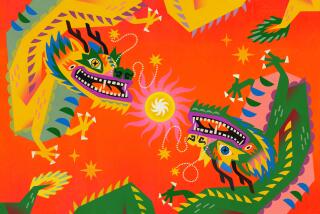A look at Hollywood ad the movies : MR. STONE, MEET MR. WANG : ‘The Joy Luck Club’ Gets Backing From a Very Unexpected Source
- Share via
In 1985, Oliver Stone was a pariah in the Asian-American community--the little-known writer of Michael Cimino’s “Year of the Dragon,” which portrayed Chinese youth gangs in a particularly ruthless light. One of his more vocal critics: director Wayne Wang (“Dim Sum”), who was riding the success of his 1982 debut feature, “Chan Is Missing.” With such a scarcity of Asian-themed movies, he argued, why release one with role models so negative?
Enter Janet Yang, the manager of a Bay Area theater and Asian film distribution company who shared a storefront office with Wang. Though she was acquainted with Stone through a former boyfriend, it was not a relationship she flaunted. “Knowing Oliver Stone was not the way to ingratiate yourself into the San Francisco Asian-American community,” she recalls. “There was an undeclared war between him and Wang.”
Eight years later, the two have made up, converging with Yang on Hollywood Pictures’ $11-million film adaptation of Amy Tan’s best-selling novel, “The Joy Luck Club.” Stone and Yang are executive producing the lyrical tale of two generations of Asian mothers and daughters. Wang is the director of the movie, which was shot in San Francisco and China and is scheduled for release in September.
The road to the screen was a circuitous one.
As a Universal production executive, Yang had initiated the biopic about martial arts legend Bruce Lee, “Dragon.” “The Joy Luck Club,” which she’d read in pre-publication manuscript form, she knew, was a tougher sell.
“ ‘Joy Luck’ is all-female,” Yang explains, “and has no stars or overt commercial hook. With such obvious strikes against it, it needed a strong producer as a champion.”
Stone, with whom Yang has worked for the past four years, fit the bill. His Ixtlan Corp. agreed to finance it through a development fund at Carolco Pictures. Subsequently caught in the morass of Carolco’s financial woes, however, the project became stalled at the starting block. Tan, Wang and Oscar-winning screenwriter Ron Bass (“Rain Man”) decided to develop it on their own and returned to Ixtlan, script in hand.
In the spring of 1992, Disney’s Hollywood Pictures agreed to produce and distribute the movie. “Joy Luck,” after all, is a film in the Disney tradition--a low-budget alternative to big-star “packages.” And, like Merchant Ivory and Miramax--with whom Disney has cut deals--the movie feeds into the studio’s plan to diversify its “high-concept” portfolio.
Hollywood Pictures President Ricardo Mestres admits the movie is “potentially difficult to present because of its almost exclusively Asian-themed subject matter.” Still, he maintains, it strikes a universal chord. Though he refuses to air the preview process in public, insiders say the film is playing extremely well. Six weeks ago, the movie went over big with a sophisticated audience, skewed more “female” and older than the norm. More significant, “Joy Luck Club” played equally well to a mainstream, “Encino Man”-type crowd watching the movie a few weeks later.
Wang, meanwhile, has another project in development with Stone--one dealing with Vietnamese youth gangs in America. A less off-putting subject, perhaps, now that Asian-themed films such as “Rising Sun,” Stone’s “Heaven and Earth” and David Henry Hwang’s “Golden Gate” will be surfacing before long.
“There are more Asian images out there now,” observes Yang. “Everyone’s not so sensitive. (The fact that Wang, himself, is plunging into the subject) is a sign of changing times.”
More to Read
Only good movies
Get the Indie Focus newsletter, Mark Olsen's weekly guide to the world of cinema.
You may occasionally receive promotional content from the Los Angeles Times.










